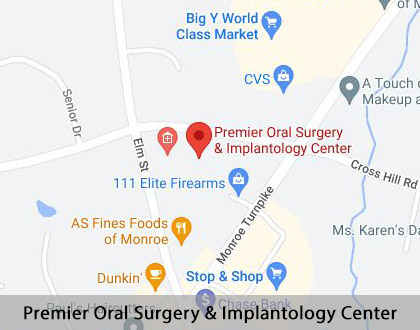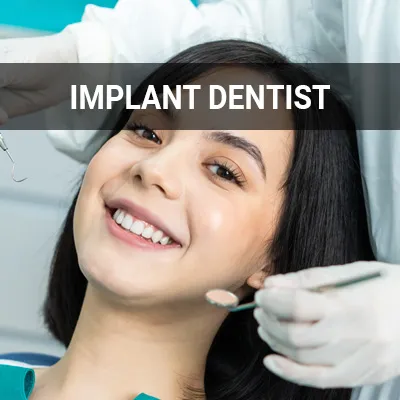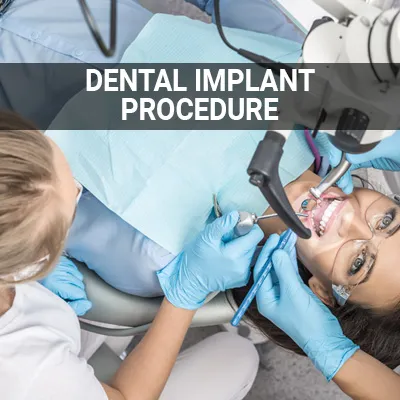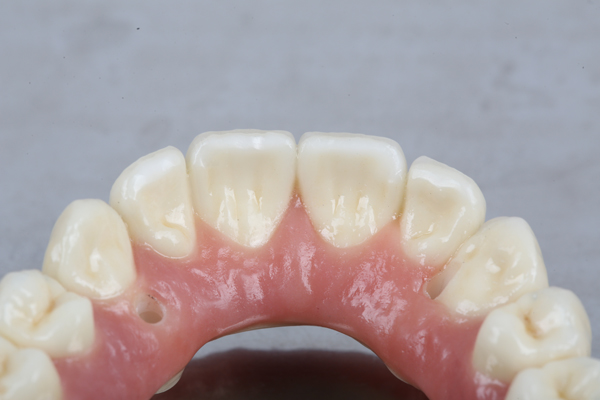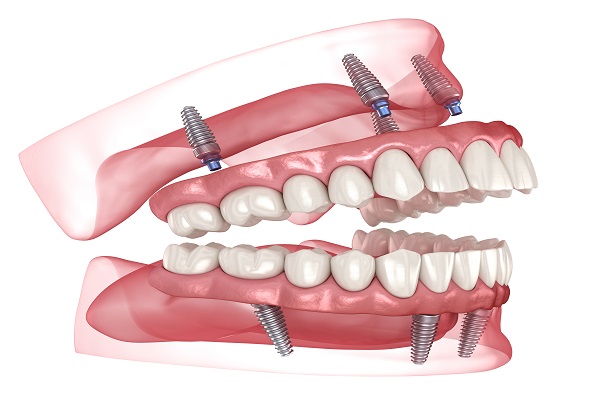Restoration of Failing Dental Implant Monroe, CT
Dental implant restoration involves retreating failing dental implants to help restore function and appearance. Oral surgeons are well-versed in placing, replacing, and restoring dental implants. In some cases, the implant itself may need a replacement. In other cases, the abutment or dental restoration requires replacement. In either case, failed dental implant treatment can yield positive results when treated early.
Dental implant restoration is available at Premier Oral Surgery & Implantology Center in Monroe and the surrounding area. Our oral surgeon will assess your case, determine the root cause of implant failure, and help restore it to full function if necessary. Call us today at (475) 474-6204 to schedule an appointment or learn more about our services.
When Implant Restoration is Necessary
Dental implants serve as artificial tooth roots in patients with missing or severely compromised teeth. Dental implants consist of three components: the implant post, the abutment (or connector piece), and the dental restoration, such as a crown, bridge, or denture. Although implant failure is quite rare, only 5% of failed cases may happen due to bacterial infection, premature loading, inadequate bone support, and Bruxism.
A dental implant restoration is necessary when implants do not function properly or as intended, leading to further oral health complications. Restoring a dental implant involves:
- Assessing the root cause or issue
- Reimplanting the implant
- Removing the implant
- Waiting for the healing period to complete
Going without retreatment of a failing dental implant can result in pain, bone loss, inflammation, and infection.
“A dental implant restoration is necessary when implants do not function properly or as intended, which can lead to further oral health complications.”
The Commonality of Implant Restoration
Dental implant complications are quite common, although they are more prevalent in some areas of the mouth than others. Dental implant specialists and oral surgeons are well-versed in the application and restoration of dental implants.
Despite the rarity of implant failure, complications may arise, signifying a need for adjustment, replacement, or total retreatment. We can determine the cause of the complication and provide a patient with the right treatment for their case. For example, in cases of insufficient jaw bone density, the patient may need a bone graft to build up bone tissue and provide a stable base for the implant.
“Dental implant specialists and oral surgeons are well-versed in the application and restoration of dental implants.”
The Implant Restoration Procedure
If a dental implant fails or breaks, the patient needs immediate intervention, which involves removing the implant as soon as possible. In cases of a broken implant, it may be possible to replace it during the same or subsequent appointment without further treatment. This is the case for loose or broken abutments and restorations as well.
However, in cases where the implant fails and does not function properly or affects surrounding structures, a more deep-rooted issue is typically at play. In such cases, the oral surgeon will need to remove the entire implant. In addition, some patients may require a bone graft, while others may need surgery before placing them in another implant. Nonetheless, the patient will likely need to let the site heal for up to six months before restoring the implant. Once the area heals and the patient completes any other necessary procedures, the oral surgeon restarts the new implant process.
“Dental implant failure requires immediate intervention, which means the implant must be removed as soon as possible.”
Check out what others are saying about our dental services on Yelp: Dental Implant Restoration in Monroe, CT
What to Expect After the Procedure
After-care instructions depend on the patient’s case and whether the implant was immediately replaced or requires time to heal. The same care instructions for upkeeping a dental implant remain if we replace the implant. That is, patients should brush and floss twice daily using implant-specific products and regularly visit our oral surgeon for routine checkups.
If the implant fails due to an infection or loosening of the appliance, the patient will have to wait out the healing period. During that time, our oral surgeon will instruct the patient on properly cleaning, caring for, and maintaining the site until they are ready for retreatment. Towards the end of the waiting period, they may undergo a bone graft or other surgery to hold a new implant successfully. After-care instructions will remain the same after the new implant is in place.
“…patients should brush and floss twice daily using implant-specific products and regularly visit our oral surgeon for routine checkups.”
Questions Answered on This Page
Q. When is implant restoration necessary?
Q. How common is dental implant restoration?
Q. What happens during the implant restoration procedure?
Q. What can I expect after dental implant restoration?
Q. What complications are treatable by implant restoration?
People Also Ask
Q. What are the steps to the dental implant procedure?
Q. How are dental implants different from other teeth replacement options?
Q. What is the duration and success rate of dental implant treatment?
Complications Treatable by Implant Restoration
A fractured dental implant is one possible complication of an implant procedure and typically occurs due to a failure in the design or material of the implant. A fracture may also be the result of an ill-fitting crown or overloading. Fractured implants may be fixed or replaced through implant restoration.
Another treatable complication is a loose implant. An implant may become loose due to an infection or after failing to fuse with the jawbone properly. A loose implant typically occurs soon after the implant procedure is complete. Thus, seeking immediate treatment can yield positive and successful results.
“A fractured dental implant is one possible complication of an implant procedure and typically occurs due to a failure in the design or material of the implant.”
Frequently Asked Questions
Q. What is involved in restoring a dental implant?
A. We begin by removing the dental restoration in place along with the abutment. We may need to make an incision to reveal the implant, but it should be visible after removing the abutment. We will then be able to clean out any infection, followed by initiating treatment, whether that be replacing the implant or prepping the area for surgery, depending on the patient’s case.
Q. How long does the implant restoration process take?
A. The answer will depend on the patient’s case. If the implant needs replacement, it may be done during the same or following appointment. If there is any inflammation or infection, we will need to clean it and wait up to six months for the site to heal before placing another implant. Patients requiring a bone graft or other procedure may need six months to a year before a new implant can be placed.
Q. What is the success rate of dental implants?
A. Dental implants have an average success rate of 90-95% for the span of ten years. Although the percentage of implant failure is rare, it does happen. If you are experiencing any complications, such as pain or discomfort, make sure to contact your dental specialist as soon as possible.
Q. When is a bone graft required for dental implantation?
A. A bone graft becomes necessary when the jawbone has inadequate bone density to support an artificial root. We can determine if this is the case for you during a consultation. Therefore, some patients may require a bone graft procedure during the restoration phase.
Q. What types of dental restorations are available for dental implants?
A. Implants can be attached to a crown, bridge, or dentures. Dentures come as fixed or removable appliances, depending on the patient’s preference. Crowns and bridges are fixed in place.
Start Feeling Better – Visit Us Today
By visiting us as soon as possible, our team can help get you the professional treatment you need. Instead of waiting around and allowing the symptoms to get worse, we can provide you with treatment options.
Call Us Today
If you are experiencing any complications involving your dental implant, including pain, discomfort, or loosening appliances, we can help you get the treatment you need. Going without treatment can complicate your condition even further. Call us today at 475-474-6204 to schedule an appointment with our oral surgeon or learn more about our services.
Helpful Related Links
- American Dental Association (ADA). Glossary of Dental Clinical Terms. 2023
- American Academy of Cosmetic Dentistry® (AACD). Home Page. 2023
- American Academy of Maxillofacial Prosthetics. American Academy of Maxillofacial Prosthetics. 2023
- American Association of Oral and Maxillofacial Surgeons. American Association of Oral and Maxillofacial Surgeons. 2023
- American College of Oral and Maxillofacial Surgery. American College of Oral and Maxillofacial Surgery. 2023
- National Cancer Institute (NCI). National Cancer Institute (NCI). 2023
- WebMD. WebMD’s Oral Care Guide. 2023
About our business and website security
- Premier Oral Surgery & Implantology Center was established in 2019.
- We accept the following payment methods: American Express, Cash, Discover, MasterCard, and Visa
- We serve patients from the following counties: Fairfield County
- We serve patients from the following cities: Monroe, Botsford, Stepney, Shelton, Trumbull, Ansonia, Derby, Oxford, Woodbridge, Newtown, and Redding
- Norton Safe Web. View Details
- Trend Micro Site Safety Center. View Details
Back to top of Dental Implant Restoration

